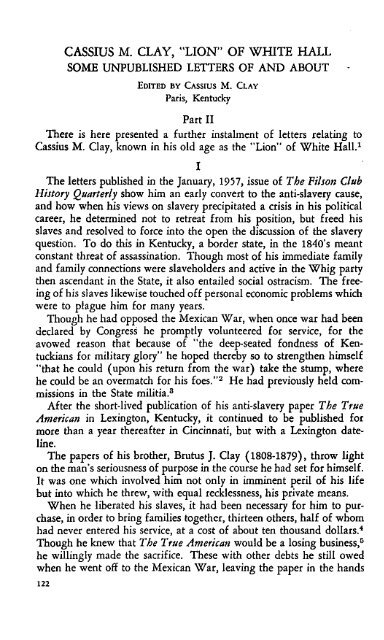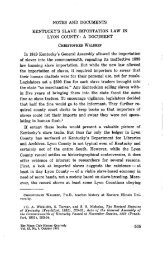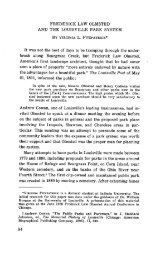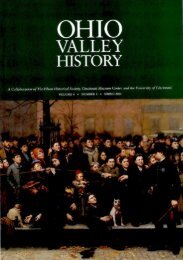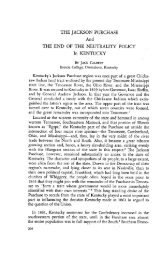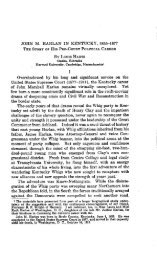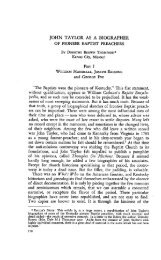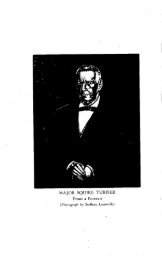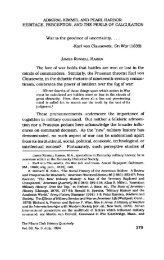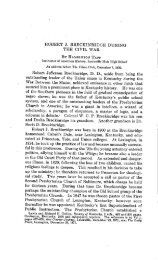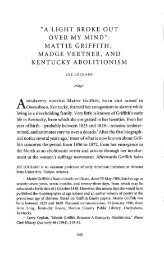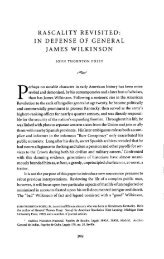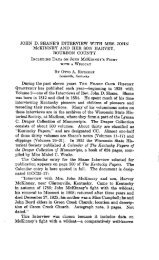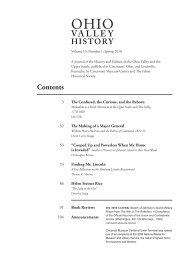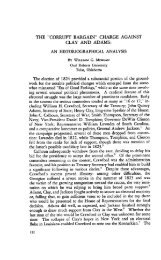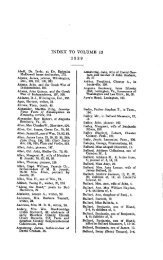CASSIUS M. CLAY, "LION" - The Filson Historical Society
CASSIUS M. CLAY, "LION" - The Filson Historical Society
CASSIUS M. CLAY, "LION" - The Filson Historical Society
You also want an ePaper? Increase the reach of your titles
YUMPU automatically turns print PDFs into web optimized ePapers that Google loves.
<strong>CASSIUS</strong> M. <strong>CLAY</strong>, "LION" OF WHITE HALL<br />
SOME UNPUBLISHED LETTERS OF AND ABOUT<br />
EDITED BY <strong>CASSIUS</strong> M. <strong>CLAY</strong><br />
Paris, Kentucky<br />
Part II<br />
<strong>The</strong>re is here presented a further instalment of letters relating to<br />
Cassius M. Clay, known in his old age as the "Lion" of White Hall. 1<br />
I<br />
<strong>The</strong> letters published in the January, 1957, issue of <strong>The</strong> <strong>Filson</strong> Club<br />
History Quarterly show him an early convert to the anti-slavery cause,<br />
and how when his views on slavery precipitated a crisis in his political<br />
career, he determined not to retreat from his position, but freed his<br />
slaves and resolved to force into the open the discussion of the slavery<br />
question. To do this in Kentucky, a border state, in the 1840's meant<br />
constant threat of assassination. Though most of his immediate family<br />
and family connections were slaveholders and active in the Whig party<br />
then ascendant in the State, it also entailed social ostracism. <strong>The</strong> freeing<br />
of his slaves likewise touched off personal economic problems which<br />
were to plague him for many years.<br />
Though he had opposed the Mexican War, when once war had been<br />
declared by Congress he promptly volunteered for service, for the<br />
avowed reason that because of "the deep-seated fondness of Kentuckians<br />
for military glory" he hoped thereby so to strengthen himself<br />
"that he could (upon his return from the war) take the stump, where<br />
he could be an overmatch for his foes. ''2 He had previously held commissions<br />
in the State militia,a<br />
After the short-lived publication of his anti-slavery paper <strong>The</strong> True<br />
American in Lexington, Kentucky, it continued to be published for<br />
more than a year thereafter in Cincinnati, but with a Lexington dateline.<br />
<strong>The</strong> papers of his brother, Brutus J. Clay (1808-1879), throw light<br />
on the man's seriousness of purpose in the course he had set for himself.<br />
It was one which involved him not only in imminent peril of his life<br />
but into which he threw, with equal recklessness, his private means.<br />
When he liberated his slaves, it had been necessary for him to purchase,<br />
in order to bring families together, thirteen others, half of whom<br />
had never entered his service, at a cost of about ten thousand dollars.4<br />
Though he knew that <strong>The</strong> True American would be a losing business,<br />
he willingly made the sacrifice. <strong>The</strong>se with other debts he still owed<br />
when he went off to the Mexican War, leaving the paper in the hands<br />
122
1957] Cassius M. Clay 123<br />
of his friend John C. Vaughan, previously Assistant Editor, with Paul<br />
Seymour as its business agent, and a power of attorney to his brother<br />
Brutus J. Clay to manage his affairs in his absence.6<br />
Before setting forth a number of letters from and about his service<br />
in the War, we shall include some correspondence about the business<br />
of <strong>The</strong> True American. <strong>The</strong> letters from his wife, Mary Jane Clay,<br />
not only reveal her sympathetic understanding and approval of her<br />
husband's course, but likewise reveal the sacrifices he made and their<br />
impact upon his family during his absence in the Ward<br />
Within a few weeks after his enlistment and while he was still in<br />
camp at Louisville, the question how the bills for publishing the paper<br />
were to be met became of pressing urgency to his business agent m<br />
Cincinnati.<br />
June 17th, 1846.<br />
Dear Brutus,<br />
Today I received a letter from Mr. Seymour saying it was very<br />
necessary to pay the bills that he sent over a few days ago, which you<br />
saw. Mr. Clay told me before he left to call upon you if subscription<br />
money did not come fast enough to pay bills as they were presented &<br />
you would attend to it. I had no idea there was such a hurry about<br />
it as I would have asked you about it at once. <strong>The</strong> amount due is<br />
$499.95 cts. Can you send the money to Paul Seymour? Whether you<br />
do or not please let me know. I have not yet put those notes in any<br />
one's hands for collection but expect to do it today. Mr. Goodloe has<br />
promised to send me up a responsible man today. I heard from Mr.<br />
Clay yesterday. He said he was well. Love to Ann.<br />
Yrs. affectionately,<br />
M. J. Clay<br />
Louisville, Ky.<br />
June 22, 1846<br />
Camp Oakland.<br />
Dear Brutus.<br />
I have just now placed in the W. Bank of Ky. here $1500, fifteen<br />
hundred dollars to be transferred and placed to your credit in Paris<br />
free of charge, which you will use for my debts to the best advantage.<br />
I drew on you for $500 which this will replace.<br />
My company is in good order and is the brag com. in camp, so<br />
admitted on all hands. We are full and all things right. I hope to<br />
remit to you again in 2 months about same amount.<br />
If you could spare the money it would be well for Wilkersons to buy<br />
about 50 more cattle perhaps.
124 <strong>The</strong> <strong>Filson</strong> Club History Quarterly [Vol. 31<br />
Mary Jane is here and will stay a few days longer.<br />
We will go to San Antonio in Bexar in Texas as a rallying point,<br />
by water I suppose to Memphis or Alexandria and thence by land.<br />
I have seen Gen'l Wool our Briga-General and he promises me fair<br />
play<br />
Your bro.<br />
C. M. Clay.<br />
Lexington, Ky. June 26th, 1846.<br />
Dear Brutus.<br />
I have just returned from Louisville having been on a visit to Mr.<br />
Clay but he is so much engaged with his men that I felt but little<br />
inclined to remain long feeling as if I was an incumbrance. Upon his<br />
business I said very little for that is never an agreeable subject to him.<br />
He told me had deposited $1500 in bank for you. I hope you received<br />
my letter last week asking you as a great favour to send Paul Seymour<br />
[Mr. Clay's agent at Cincinnati] $400 & some odd dollars & to let me<br />
know if you could, would & should send it. I have not received an<br />
answer from you & I rec'd yesterday another letter from Seymour praying<br />
to have it there by the 27th of this month. I will be very much<br />
obliged to you to send me an hundred dollars for my own use if you<br />
can, that is out of that fifteen hundred dollars above spoken of, as<br />
Mr. Clay's deposit in your hands for his bills. I want to pay for some<br />
groceries to the amount of 50 odd dollars & buy wood, etc., etc. But<br />
if I am mistaken do not send it for I will prefer to wait longer for<br />
money that is due. Goodloe sent up a man to collect those debts I<br />
showed you. He is an old collector in this County. He says the principal<br />
ones of them are not worth a cent, many of the men he does not<br />
know & advised me to address the most of them through the P.O. which<br />
I have done today. I saw your Mother, indeed she went to Louisville<br />
to see Mr. Clay & returned the day she got there very much pleased<br />
with the Boat & the trip.9 Give my love to Ann & Martha1° and<br />
believe me sincerely<br />
Yrs. affectionately<br />
M. J. Clay<br />
Lexington, June 29th, 1846.<br />
Dear Brutus.<br />
I have rec'd another letter from Seymour & another bill from<br />
Ochiltree, calling for $290.00 which you will please send him from<br />
Paris or send here but I should think it best to send directly to him from<br />
you & he can send me receipts. I suppose you have rec'd my letter asking<br />
for 100 dollars for my own use. Discontinuances for the paper are
1957] Cassius M. Clay 125<br />
coming in rapidly & subs. few & far between. I fear Mr. Clay's going<br />
to the war has been a fatal blow to the paper's prosperity. Several of<br />
the Northern papers are quite warm against him. 11<br />
Adieu<br />
Yrs. Affectionately<br />
M. J. Clay<br />
I have received your 1st check for $449 etc.<br />
Lexington. June 29th, 1846<br />
Dear Brutus.<br />
I have just sent a letter off to you written today & when I carried<br />
that to the P.O. I received another from Poor Seymour. He is in great<br />
distress about not having rec'd the money in time. I have just sent it<br />
off this morning as soon as Bank opened, as I received it late Saturday<br />
afternoon past Bank hours. He sends afiother Bill in, that will fall<br />
due on the 6th of July & he wishes me to have the money there in<br />
time, $550, together with a bill from Butler & Bro. of $204.00 for<br />
paper. I send you the note from Butler & Bro., to Seymour & see if<br />
you do not understand it as I have stated above. Seymour does not and<br />
neither you see does Butler say what the 550 dollars is due for. I received<br />
a letter from Mr. Clay this morning. He does not say anything<br />
about leaving. Let me know Brutus if you please your answer to these<br />
bills and whether you have rec'd the check Mr. Clay sent you.<br />
Adieu<br />
yrs ever affectionately,<br />
M. J. Clay<br />
Lexington, July 9th, 1846.<br />
Dear Brutus.<br />
I rec'd the bill for $204.00 yesterday & immediately attended to it.<br />
Last week I wrote to Seymour concerning the $550 mentioned in one<br />
of his letters & have as yet received no answer. After I rec'd your<br />
letter yesterday, I went to Mr. Clay's desk & got his agreements with<br />
the men in Cincinnati & therefore can tell you as well as Seymour<br />
what the expenses are yearly & monthly. He agrees to pay Brooks &<br />
Ochiltree for Printing $50 for every 3000 copies of the T. A. & 40<br />
cents a token or quire for all over that number, said payment to be<br />
made at the end of every month. He agrees to pay Seymour $500<br />
annually to be paid semi-annually--He agrees to pay Vaughan $1000<br />
annually to be paid monthly & then he has to pay for Paper (I suppose<br />
judging for the bill I have seen) about $200 monthly on an<br />
average. I have made a rough calculation & the amount a month for
126 <strong>The</strong> <strong>Filson</strong> Club History Quarterly [Vol. 31<br />
all expenses pertaining to the Press, comes to $552.40 cents monthly.<br />
You see the money you sent me was to pay bills for May & June. <strong>The</strong><br />
sum total for year I calculated to be $6,636.00. I have no doubt Mr.<br />
Clay would object very seriously to stopping the paper. I wrote to<br />
him before he left Louisville, somewhat concerning the business of the<br />
paper. He answered that letter the day he was to embark on the boat<br />
"Vesta" in a hurry, mentioned he had rec'd my letter & would write<br />
again from Memphis. My dear Brutus yon do not know how distressing<br />
it is to me that Mr. Clay is so troublesome to you concerning<br />
his business & with how much gratitude I receive your kind attentions.<br />
I hope for a change for the better. I looked over his papers again this<br />
morning & find Charles Searcey's note for $275.00 is now due, the man<br />
that rents his mills in Madison. I hope to receive money from the<br />
North due from Mr. Clay's agents to whom I have written. I mean to<br />
see Mad. Johnson this morning about some notes I see he has to collect<br />
for Mr. Clay & hurry him in the collection of them (if possible) & hope<br />
before the end of July by some means to have the money ready for<br />
Seymour. As for my family expenses it takes but little to furnish them.<br />
I would not for any consideration take upon myself the responsibility<br />
of stopping the issue of the T. A. & therefore say nothing about it to<br />
Seymour.<br />
I am in continual receipt of this discontinuances, no subscribers.<br />
Will you write to Searcey about the money due now? I wish you<br />
would, or shall I? How do you feel about your election?m Pretty confident<br />
I hope. Give my love to Ann & Martha & believe me, ever yrs,<br />
etc.<br />
M. J. Clay<br />
Saturday, 5th Sept.<br />
Dear Brutus.<br />
As Ann has told you I suppose, I went to your house late Sunday<br />
to get from you again $500 for Cincinnati. Besides I wished to consult<br />
you about receiving books for Finch & Weed's debt. I send you the<br />
letter Seymour sent me two weeks ago I believe which I then Postponed<br />
sending to you thinking it most probable I would ride down & see<br />
you myself. A debt of $1000 is due this day in the Northern Bank &<br />
a man brought me a note of Mr. Clay's for $55 to be paid in Nov. l<br />
think & offered it to me for $50 if I could pay it then. I hope all the<br />
money Mr. Clay paid out for the Volunteers1 will not fall due before<br />
he receives something from them to pay with! I have now had Seymour's<br />
bill for a week & as the money has to be paid I always like to<br />
meet the debts more promptly. You will gratify & oblige me very much
1957] Cassius M. Clay 127<br />
Brutus if you will hereafter send me $500 on the 25th of every month,<br />
unless I write you to the contrary, if it does not put you to too much<br />
inconvenience. I have no doubt I can get an amount of money from<br />
Mad. Johnson which would perhaps save you the trouble of borrowing!<br />
What think you of it? I shall look for Ann on her way to Richmond<br />
next week tell her. As the children are neither of them at home I send<br />
Jerry with this note.<br />
Adieu,<br />
Yrs. affectionately,<br />
M. J. Clay<br />
P.S. Brutus I want $117 for City Tax if you please.<br />
Monday, Lex. 28th Sept. '46<br />
Dear Brutus.<br />
I have seen Mr. Vaughan & received a letter from Seymour upon<br />
the business of the True American & will ride down to see you as<br />
soon as I am able. My little Cassius14 is not well now--as soon as his<br />
health is again established I will come. Sallie Ann Goodloe & her husband15<br />
are now quite ill with Fever. I have taken all their children<br />
in charge until their recovery. Your mother is here waiting on her.<br />
I have not heard from Mr. Smith's1° family... Tell Ann I received her<br />
note and attended to it accordingly. I neglected to send the letter to<br />
Miss Field1¢ as I promised Ann the morning she left & since then my<br />
own children & the charge of Sallie Ann's together with sitting up with<br />
my [son] four nights to alleviate his cough, visiting Sallie Ann as often<br />
as possible & attending to the Paper has almost set me wild & I have<br />
not thought of that promise except at times when it was impracticable<br />
to attend to it . . . Seymour has sent me his bills. <strong>The</strong>y amount to<br />
$488.23-1/3 cents. As soon as convenient please send the check.<br />
Love to Ann<br />
Yrs affectionately<br />
M. J. Clay<br />
II<br />
<strong>The</strong> decision as to what should be done about the True American<br />
in the absence of Cassius in the war and the receipt of further<br />
advices from him, was a heavy one for his wife and brother to make.<br />
As the above correspondence clearly shows it was losing money at<br />
the rate of $500 a month, an amount which could not readily be spared<br />
in view of other obligations to be met. Factors which may have entered<br />
into the decision were his wife's dread of debt as well as his brother's<br />
lack of confidence in the Cincinnati business agent's ability to put the<br />
paper on a paying basis. <strong>The</strong> correspondence warrants the construction
128 <strong>The</strong> <strong>Filson</strong> Club History Quarterly [Vol. 31<br />
that the decision to discontinue the paper, which was made as soon<br />
as the two could meet to discuss the matter after the receipt of the<br />
letter of September 28th above set forth, was influenced by both of<br />
these factors, for on October 11th we find Mary Jane writing to Brutus:<br />
"'I have determined that it is best that I should go over to the Farm<br />
& pass the winter, until March. It is impossible to live in town on the<br />
same means that I can in the country & I have determined to go. It<br />
may be but a drop in the bucket toward liquidating Mr. Clay's debts,<br />
but many drops fill the bucket after a while & debt oppresses me.''is<br />
<strong>The</strong> decision, however, was not made until after, upon request<br />
of Brutus, Seymour had furnished the following information, dated<br />
October 6th:<br />
"We have on our books at this time 4150 subscribers, all of whom,<br />
with some exceptions in Kentucky, have paid in advance. Of this number,<br />
1400 have expired between No 52 of the 1st vol. and 7 of the 2d,<br />
and have entered on the second year, and will of course renew their<br />
subscriptions. 600 will have expired between now and the 11th of<br />
Nov., the remaining 2000 will expire at various periods, as their subscriptions<br />
commenced--say 1000 from the 11th of Feb. to Sept. '47.<br />
From this you can gather some idea of Mr. Clay's indebtedness to the<br />
subscribers.<br />
"When the paper was brought here there were 3000 subscribers on<br />
the books. Of that no. 1200 have discontinued. Just at that time a<br />
great recession was made in our list; what course the subscribers then<br />
gained will pursue with regard to receiving subscriptions is hard to<br />
say. I look for a proportionate decrease.<br />
"I have sent, enclosed in the paper, bills to all subscribers whose time<br />
has expired; except the cities and larger towns of the East & Kentucky;<br />
the former must be collected by agent. I have discontinued the agencies<br />
of Caleb Hartshorn and Finch & Weed. <strong>The</strong>y are delinquent; the<br />
former owing over $350, the latter $180. Mr. Clay took the management<br />
of these persons upon himself.<br />
"<strong>The</strong> whole expense of the paper per month is $480. This embraces<br />
paper, printing, etc., editors and agent's salaries.<br />
"Here is a list of post-offices in Kentucky that owe the paper. 1<br />
Richmond $50 Hopkinsville $9<br />
Frankfort 20 Georgetown 4<br />
White Hall 39 Danville 3<br />
Yarnalton 15 Versailles 9<br />
Paris 9 Caseyville 3<br />
Manchester 3 Bardstown 3
1957] Cassius M. Clay 129<br />
Chilesburg 6 Augusta 3<br />
Stanford 6 Winchester<br />
Griffith 3 Owensboro 3<br />
Bloomfield 3 Tompkinsville 3<br />
Morelands 3 Portland 3<br />
"Out of Kentucky, I do not think there is a hundred dollars due the<br />
paper, except that owing by the agents.<br />
"I think it would be judicious for you to come over here; you could<br />
then learn more exactly how matters stand.''2°<br />
Found in the Brutus J. Clay papers is the following sharp answer<br />
of Seymour to the instructions of Mrs. Clay to discontinue the paper:<br />
Cincinnati, Oct 22 '46<br />
Madam, r<br />
Yours of the 19th came to hand yesterday. Your letter bearing date<br />
of Oct. 9th was duly received, too late, however, to follow the instructions<br />
it contained, namely to announce the discontinuance of <strong>The</strong> True<br />
American in the number then publishing. <strong>The</strong> T. A. though dated<br />
Wednesday, goes to press, or has gone, rather, every Tuesday at 7 o.c.<br />
A.M. I did not receive your letter until noon on Tuesday. More than<br />
half of the edition was then printed; besides, paper for the then coming<br />
no. was delivered by Butler, and I believe "wet down" for use; consequently<br />
we had to print.<br />
I did not reply to yours of the 9th, because the supposition gathered<br />
from it was, that you left immediately for your farm, and that that<br />
• note was to end our correspondence. I therefore addressed B. J. Clay,<br />
acknowledging receipt of the notice, etc.<br />
I regret that a step, so fatal to the fair fame of your husband, should<br />
have been deemed necessary, and so unwisely and hurriedly carried out.<br />
I would have written you on receipt of the notice, pointing out to you<br />
the injudiciousness of thestep, had the letter been less urgent, and did<br />
I think my motives would have been truly interpreted, which I had<br />
reason to believe would not, from the absence, from the beginning, of<br />
that entire and honorable confidence, essential to the harmony and<br />
success.<br />
My own interest in the continuance or discontinuance of the paper is<br />
to me a small matter. But I deplore the unnecessary destruction of an<br />
absent, brave man's reputation. I do solemnly believe that had fifteen<br />
hundred dollars been handed to Vaughan to carry on the paper, coming<br />
out in his own name, and taking all the responsibility of fulfilling its<br />
contracts & etc, that it would have saved what Mr. Clay can not in<br />
ten years of the hardest struggle regain. I hope you will not mistake
130 <strong>The</strong> <strong>Filson</strong> Club History Quarterly [Vol. 31<br />
the spirit of this letter. I write, faithful to my feelings and conviction,<br />
not to dash the hopes which must be so near your heart . . .21<br />
I have the honor to remain<br />
Your obdt servant,<br />
Paul Seymour.<br />
<strong>The</strong> Farm, Madison Co., Ky. Nov 8th '46<br />
Dear Brutus,<br />
Last night I received your note dated the 5th of Nov. & from its<br />
contents judge the Mr. Clays who was here from Bourbon Co, looking<br />
at the cattle did not purchase them from you. <strong>The</strong>y mentioned that<br />
you had written to me but I have not received a note from you except<br />
the one of the 5th of Nov. & that date is since they were here. I shall<br />
have to wait to pay all the bills in Cincinnati until the cattle are<br />
sold... Will it be too much to ask of you, to give me a list of all of<br />
Mr. Clay's debts to you & to the Bank and any other you know of. Since<br />
coming to the farm I have made a rough calculation of the amount of<br />
money necessary to carry on the Farm & pay all expenses of Town and<br />
Country. All things included, it amounts to "$3000 thereabouts, used<br />
economically. All other income, to whatever amount as long as I have<br />
a word to say in the matter, shall be exclusively devoted to the payment<br />
of Mr. Clay's debts &.with my consent I will never leave the Farm till<br />
every debt is paid. I would not, if it can possibly be prevented, at a<br />
good deal of sacrifice, give up our place in town. Except the keeping<br />
of it in repair, it will not now cost anything & that I think I have made<br />
arrangements to do, from its own income, save the tax. I received two<br />
letters, from my dear husband yesterday. He desires me to remember<br />
him to you & Ann, affectionately. He has been generally well, but was<br />
suffering from a cold. <strong>The</strong> date of the last letter was the 8th of Oct.<br />
<strong>The</strong> Monday after the letter was written they were to march from<br />
Camargo. He says he hopes from there to be able to send me $1500.<br />
I suppose he would like to have that used to payment of horses & all<br />
the other debts incurred for the troops. Very likely he will mention,<br />
how be would prefer having it disposed of, & so it shall be done. I<br />
have had no other bill presented for payment of horses, except the<br />
one I mentioned to you some months ago. Brutus if it accords with your<br />
judgment I would prefer keeping sufficient funds at my command to<br />
pay monthly expenses & have no account, none at all. <strong>The</strong> amount of<br />
money for that purpose would be $ 80 - 50 without including any<br />
incidental expenses; such a additional help in the'spring, corn cutting<br />
time, etc....<br />
My desire is, that the money for cattle be deposited in Bank subject<br />
to my order, which I hope will amount to $3000 & the rest of Mr. Clay's
1957] Cassius M. Clay 131<br />
income to be used according to your judgment in paying off debts. I<br />
will hand it over to you as it comes in. This management is to be<br />
according to my judgment & my pleasure; I hope it will accord with<br />
yours..... .. . •<br />
I have not been able to get in Mr. Clay's desk here, having never<br />
found the key of it. He said it was in Lex. I have looked wherever<br />
I could think of. <strong>The</strong>re may be some important papers, may be some<br />
debts due, now in the desk. Do you not think I had better have the<br />
desk lock picked ?<br />
I get letters from the P.O. in Lex. every week & am returning all<br />
moneys sent as subscription to T. A. as fast as it comes in...<br />
Yr. affectionate sister,<br />
M. J. Clay<br />
III•<br />
In almost the same mail, came a long letter from Cassius:<br />
Camp near Vavaca on<br />
the Gulf of Mexico, Texas<br />
Oct 12, '46<br />
Dear Brutus<br />
I suppose that you have often heard through Mary Jane of our<br />
whereabouts, and of the hardships of our march. We are now in the<br />
most unhealthy part of Texas, with half of our command unfit for<br />
service. But luckily we are to move for Camargo on the Rio Grande<br />
tomorrow, and though we march through a desert it is preferable to<br />
this inglorious inaction.<br />
It is believed here that the truce of two monthsm will terminate the<br />
war, if so we have lost many valuable lives withou ttiking a blow.<br />
I was sorry to hear of your defeat, 2B but such is the fate of war, and<br />
sooner or later all politicians meet the same fate; but as you have<br />
phi!osophy enough to bear all those things easily it is unnecessary for<br />
me to say anything.<br />
I suppose my business is troublesome to you especially the calls for<br />
money for the paper, etc. I expect to send you about $1500 in five<br />
weeks and the sale of stock at the farm and some debts may keep you<br />
going till I see you.<br />
I want Wilkerson to stock the farm as usual. I want the paper continued<br />
till my return, when I will take such action as I deem thost<br />
advisable all things considered. <strong>The</strong> more I see of slavery in the south<br />
the less I like it, and I think the annexation and war of Texas will<br />
not strengthen the "peculiar institution." I am sorry you have so<br />
much invested in slaves as troublesome times are ahead. Could it<br />
not be well to lighten off the vessel somewhat for the rough seas?
132 <strong>The</strong> <strong>Filson</strong> Club History Quarterly ['Col. 31<br />
I learn that a strong anti-slavery feeling mingles with the convention<br />
question.24<br />
Texas is a miserable country. <strong>The</strong> Eastern part pine and hickory<br />
and sandy--the western, prairie, muddy and quicksands and mesquite-the<br />
whole state is not worth six cents an acre, as the climate is warm<br />
and sickly and enervating and must ever be inhabited by a semi-civilized<br />
and degenerate people.<br />
I had a long journey through the Northern part on a buffalo hunt,<br />
some of which I killed. I had a very adventurous and exciting time<br />
of it.<br />
We see here sometimes sixty deer together and they cease to excite<br />
us they are so plenty.<br />
Between here and the Rio Grande we shall see plenty of deer and<br />
wild horses, but be in no state for amusement as water is scarce and<br />
we shall have to make forced marches for many days without water<br />
or horse feed except grass.<br />
I have been so fortunate so far as to have lost not a single man;<br />
though now half of my company are unfit for service, and several<br />
have been discharged. My company has maintained its ascendancy for<br />
good deportment and military bearing, so that Gen'l Wool desires the<br />
honor of selecting us out of the ten to accompany him to Chihuahua,<br />
where we would have gone but for some obstacles unforeseen at the<br />
time of the order.<br />
Colo. Marshall25 was ordered to move by water to the seat of war;<br />
and so we might have been in Monterey at the fight. <strong>The</strong>re is very<br />
great dissatisfaction shown about it and a heavy responsibility upon<br />
him for the loss and inaction of our regiment!<br />
Tom Marshall2e is under arrest for fighting a duel with my lieutenant<br />
James J. Jackson2r of Woodford and is as usual drunk and<br />
unpopular. Some of his men have left him and joined my company<br />
and more would do so if he would let them, which he will not do as<br />
he hates me as a rival.<br />
Owsley2s has gained nothing by his base ingratitude to his tried<br />
friends, as not one of them have proven themselves fit for command.<br />
<strong>The</strong>y say I could get seven votes to Marshall's one for Colo. if it was<br />
put to the men, so that I am very much content with the good opinion<br />
of the men. Lieutenant Colo. Field29 fills his place very well and is<br />
popular---Gaines8° not so much so.<br />
Ed Fieldzl and Clay Smithz2 are well and in fine spirits and seem<br />
as if they would stand the campaign very well.<br />
<strong>The</strong> particulars of the taking of Monterey you will receive no doubt<br />
long before you get this as there is no post office here and no regular
1957] Cassius M. Clay 133<br />
means of conveyance. If you write to me address your letter to "Gen'l<br />
Butler's Command, Colo. Marshall's regiment, at "Camargo, Mexico."<br />
It would be well for you to make the sales of the stock on the farm<br />
and pay Wilkerson the money to rebuy when the time comes for laying<br />
in a new stock of cattle. Wilkerson is a good fellow but his responsibilities<br />
ought not to be increased more than is absolutely necessary.<br />
We are in a hurry preparing for the move tomorrow so that I must<br />
close this letter.<br />
Thanking you for your repeated kindnesses and sacrifices for me<br />
I remain ever your<br />
bro.<br />
C. M. Clay<br />
My love to Ann and the children.<br />
Due to the irregularity of the mail service, family and friends were<br />
often dependent upon word brought home from the War by returning<br />
soldiers, furloughed home because of sickness.<br />
October 29 - 1846<br />
Dear Brutus,<br />
•..James Jackson a is here. I have seen him. He is just three weeks<br />
from Port Vavaca. He left Mr. Clay well, thinner than usual & perfectly<br />
disgusted with his Commanders. It was all a lie as I said and<br />
supposed about his going to San Antonio for an order from Gen'l Wool<br />
to join his command. He got lost in the hunt & by means of his compass<br />
found his way to San Antonio...<br />
Affectionately yrs, etc.<br />
M. J. Clay<br />
November 14th 1846<br />
Saturday<br />
Dear Uncle<br />
Grand Mother received a letter from Uncle Cassius on yesterday at<br />
Vavaca. This is the first letter Grand Ma has received from Uncle<br />
Cassius and I think it has been very gratifying to her, he spoke of their<br />
long and tedious journey, but said he had been well himself although<br />
so many of them had suffered from sickness. He also spoke of Col.<br />
Marshall's intemperance (which by the by is mentioned in all the<br />
letters to this place) and appeared to regret not having been in the<br />
engagement at Monterey.<br />
<strong>The</strong> negro man who went as Clay's * attendant passed through here<br />
yesterday with two of the Madison company returning home on account<br />
of sickness. I understand James Stone3 is coming home also---
134 <strong>The</strong> <strong>Filson</strong> Club History Quarterly [Vol. 31<br />
he has had two violent attacks...<br />
I remain in haste and affection<br />
Your niece<br />
Sallya6<br />
<strong>The</strong> next letter was brought back to Kentucky by a returning soldier:<br />
Camargo, Mexico<br />
Dec. 13, '46<br />
Dear Brutus<br />
I sent you a few days ago $2000 in Treasury notes payable to the<br />
order of John Tilford to prevent abstraction and fraud. I now send<br />
you by W. McCalla another note of same endorsement for $500, one<br />
hundred dols. of which belongs to Mr. John McCracken of Lexington<br />
sent by me from his son, which you will please pay over as soon as<br />
possible.<br />
I hope this amount together with other debts will prevent you from<br />
any additional burden. I am economizing and hoping to get out of<br />
debt after awhile.<br />
We are at present inactive as Gen'l Taylor seems to be awaiting the<br />
action of the Mexican Congress and the impression seems to be that<br />
we have made a false move in the war and that it is impracticable to<br />
advance farther by land and get supplies. <strong>The</strong> more I see of war the<br />
more I hate it in all its consequences. I am in good health and tolerable<br />
spirits. <strong>The</strong> bearer is about starting and I must bid you adieu--My<br />
love to Ann and the children.<br />
Yours ever.<br />
C. M. Clay<br />
<strong>The</strong> next letter is of interest principally because of its mention of<br />
cattle prices, etc. then obtaining in Kentucky, though it does contain<br />
the last word of Cassius perhaps received prior to his capture by the<br />
Mexicans on January 20, 1847.<br />
Feb'y 4th 1847<br />
Dear Brutus<br />
Mr. Wilkerson returned last night from buying cattle & brought 50 'head<br />
with him. He went through the counties of Lincoln, Garrard &<br />
Mercer. Before he left home he bought 15 head for which he paid<br />
$135. <strong>The</strong>y however are too young for next Fall sale. So also are some<br />
of the 50 which he brought home with him yesterday. Previous to his<br />
leaving home he sold to Chenault 4 head of the cattle which were ready<br />
for market at $30 a head 2.. He counted the shocks of corn & on the<br />
1st of January he had 1451 shocks averaging 1 barrel to the shock. I
1957] Cassius M. Clay 135<br />
heard from Mr. Clay yesterday through some gentlemen of Richmond.<br />
He had marched through Camargo on his way to Saltillo to join Gen.<br />
Worth. I hope he has left Marshall's command. He was in high spirits<br />
the writer said. Let me know whenever you hear from him if you<br />
please. Love to Ann & Martha. When are you coming over?<br />
P.S. Mr. Wilkerson says cat!le worth buying are high and scarcer than<br />
he ever knew them to be.<br />
Good bye<br />
Yrs. affectionately<br />
M. J. Clay<br />
Patrick Boyle, the writer of the next letter, was a former tenant of<br />
Brutus J. Clay, who had moved to Hardeman County, Tennessee:<br />
March the 31, 1847<br />
Mister Brutus J. Clay,<br />
On this morning I take my pen to inform you that your Brother<br />
Casies Clay is taken Prisnor By the Mexicans. But they are giving him<br />
good treatment, as I am told. I have heard from there lately. Buy a<br />
young man that cum from there. And young Henery Clay got killed. I<br />
have not heard from Mister Fields that is your Brother in law and made<br />
every inqiry aBout him. Mister Clay i would be wiling to go back to<br />
Kentucky to live with yu again if youre not engaged with any other<br />
man and if yu dont want me i shall not go back there, there is no<br />
other man i would go back to. I hope this leter may find you and family<br />
in good health. Let me know have yu any man living with yu now.<br />
I have no more to say But remain yours Respectful<br />
Patrick Boyle<br />
Direct your letter to Whiteville, Hardyman county, State of Tennessee<br />
Next is a letter from an uncle of Mrs. Clay:<br />
Lexington, March 31st, 1847<br />
Mr. B. J. Clay<br />
D Sir,<br />
After you left town today, Mr. Jno. Brand rec'd a letter from New<br />
Orleans of date 23rd by the Sultana, the same boat that brought the<br />
ac't of the action at Buena Vista, from his grandson Wm. H. Brand.<br />
After it had been sealed and closed, there is a postscript on it in these<br />
words, to wit "C. Clay has been exchanged. IVm. Tu/ts for FT. H.<br />
Brand"--<br />
Mr. Tufts is the Capt. of the Sultana & carried Wm. H. Brand to<br />
New Orleans--We therefore infer after the letter was written & deposited<br />
to be sent on the Sultana Brand went to the Capt. & had the<br />
endorsement made from information then rec'd--it is taken as a fact--
136 <strong>The</strong> <strong>Filson</strong> Club History Quarterly [Vol. 31<br />
I thought you would be pleased to hear it therefore write you--the<br />
postscript is dated 23rd March.<br />
Yrs. Truly,<br />
Ben Warfield<br />
B. J. Clay, Esq.<br />
Bourbon Cry.<br />
April 25th 1847. <strong>The</strong> Farm<br />
Dear Brutus,<br />
I rec'd a letter from Mr. Clay near a month ago giving me a minute<br />
account of his captureY He was well & treated as well as could expected<br />
to be. I am looking anxiously for another letter hoping he will<br />
tell me he will be with us as soon as possible after the 6th of June. I<br />
saw that foolish letter of H. Marshall, in the Louisville Journal, saying<br />
the prisoners "can get home in a few days after you receive this letter."<br />
Of course it inspired a hope, although I tried to convince myself the<br />
man was not thinking about what he was writing....<br />
Wilkerson has bought a few more cattle since you were here. He<br />
will have planted his corn by next Thursday, 140 acres. I have not<br />
yet rec'd the money for the carriage but it is now promised in May.<br />
Tell Ann she must come by to see me when she comes over to Richmond<br />
either coming or going. I expect to go up [to Richmond] in<br />
a few days & will see Martha<br />
Adieu<br />
Yrs affectionately<br />
M. J. Clay<br />
I saw Vallandingham & Kimball about their leases. Vallandingham<br />
was willing to say that he would shuck the corn to be put in the crib,<br />
but was not willing to shock it so as to secure it from rotting as he<br />
does not understand shocking. He also insists upon raising hogs for<br />
his own meat. Kimball says he had the land he rents two years free<br />
of rent for clearing the timber. So I did not close either of the leases<br />
until I could hear from you.<br />
<strong>The</strong> Farm, May 3d. 1847<br />
Dear Brutus,<br />
An hour-or two since I received a letter from Mr. Clay & your letter<br />
too. He says he is coming home that "the probabilities are that no<br />
letter from you will reach me before my final return." But Brutus my<br />
great joy is damped by the date of his letter 28th of March, St. Jago,<br />
Mexico, and he also writes, "<strong>The</strong> revolution continued here till the<br />
arrival of Santa Anna who had the address to reconcile both parties.
1957] Cassius M. Clay 137<br />
He is now in Jacabago his place of residence, a village a few miles from<br />
Mexico, whence he will go in a few days to join the army at Jalapa<br />
against Scott. Scott is bombarding Vera Cruz which must soon fall;<br />
when we trust he will take prisoners to exchange us." What does this<br />
mean? What treachery is this by Santa Anna? Did he not promise on<br />
the field of Buena Vista to send an express to the Capital with orders<br />
for liberating all American prisoners & that they be delivered to Gen.<br />
Scott? I so understood; and yet Santa Anna has had time to March<br />
800 miles since the battle & this promise made & yet on the 28th of<br />
March the prisoners still immured in the walls of Castle St. Jago. Mr.<br />
Clay says that they "are "allowed 50 cts a day as our pay which with<br />
the addition of a little more from our private purse with a negro cook<br />
(who had married a Mexican woman) enables us to fare well enough<br />
in the eating way; I sleep on a Buffalo rug & my saddle blanket &<br />
cover with another rug, with my big coat as a pillow, so that in the<br />
sleeping also, I do well enough, as I am used to hard fare."<br />
I am glad you are coming over next week. <strong>The</strong> reason I did not<br />
go down to see you I was too unwell. I got so restless at home not<br />
hearing from Mr. Clay & not being well enough to engage my mind<br />
in reading that I felt I must be moving to breathe even. So off I started<br />
Monday morning if I was made ill by the trip I did not care much &<br />
I had the kindest relatives to nurse me & I would go any how & I had<br />
liked to have been knocked up or down. But on my way over I met<br />
a letter from Mr. Clay which Pa sent me by a negro man &. this I know<br />
kept me out of sickness. Come over soon. I want to know what you<br />
think about the prisoners being detained. I cannot think, think for<br />
me? Mr. Clay sends his love to you and Ann & each of your children.<br />
I will read his letter to you when I see you. Love to Ann & believe me,<br />
Yrs. affectionately<br />
M. J. Clay.<br />
Madison Co, Ky. July 14t '47<br />
Dear Brutus,<br />
•..As you pass over to Martha Rodes s wedding I hope you will<br />
stop to see me. I received a letter from Seymour yesterday in which<br />
he says "From the many letters received by me from various parts,<br />
relative to the completing of the subscriptions of those whose time<br />
had not expired, with the T.A., I am led to think that it would be<br />
well to take council upon the propriety of making an arrangement with<br />
us to have 'the Examiner' sent to those persons to complete their<br />
time. <strong>The</strong> amount on the books of the T.A. for their incomplete subscription<br />
was $1300. We would agree to furnish the paper to them<br />
for simple cost of paper & printing. I will not express an opinion as
138 <strong>The</strong> <strong>Filson</strong> Club History Quarterly [Vol. 31<br />
to the policy of taking this step, as others more deeply interested in<br />
Mr. Clay's welfare can advise with you. "a°<br />
Today I received a letter from Pa saying that a committee of gentlemen<br />
in Gaines' district had written to him, concerning what Mr. Clay<br />
had said in his letter to me relative to the surrender of Gaines at<br />
Encarnacion.4° Mr. Clay said nothing discreditable to Gaines, but it<br />
was reported in Frankfort from Mr. Dudley41 reading the letter to<br />
some of his friends contrary to my earnest request, that no one should<br />
see it but your Mother, that he had spoken harshly of Gaines. I feel<br />
very much agitated, distressed that through my indiscretion Mr. Clay<br />
will have to suffer in any way. Come to see me & talk with me about<br />
it if convenient. Pa insisted very much upon my going over to Lex.<br />
but I thought it was more, just to have me with him, than regarding<br />
any answer to the Committee. I sent him word by Mrs. F. N. Hunt,<br />
(my sister) that if he desired to see me about the business of the letter<br />
I would go over Saturday. He could write by tomorrow's mail. I sent<br />
him Mr. Clay's letter to use if he thought proper. My little Brutus<br />
has been quite ill, though he is now much better. I had a good deal of<br />
company last week & had just returned from Lex. on a trip of two<br />
weeks, near three weeks ago, so that the children, of course, have been<br />
without instruction near a month. I do not feel as if I were doing my<br />
duty in thus neglecting them, having taken them from school for my<br />
own gratification. It distresses me, when I am compelled to do so.<br />
You will find me at home, therefore, most likely, but ! wish, as you<br />
pass through Lex. you would inquire at our house if I am in Lex. &<br />
stop to see me. I shall not be there unless it is necessary I should be.<br />
Give my love to Ann & Martha. All are well.<br />
Yrs. affectionately,<br />
M. J. Clay<br />
Mexico, June 18, 1847<br />
Dear Brutus,<br />
We the officers taken prisoner at Encarnacion and other places are<br />
still prisoners. <strong>The</strong> common soldiers were sent to Tampico about a<br />
week ago without our knowing it. What design they had in keeping<br />
it secret I don't know. <strong>The</strong>y say that Santa Anna won't exchange us<br />
because he fears the imputation of being a friend of the Americans.4=<br />
Others say we are not exchanged because Scott and Worth have refused<br />
to recognize Santa Anna in any manner because he forced the prisoners<br />
on parole taken at Vera Cruz to serve at Cerro Gordo, so between all<br />
these difficulties we may be kept during the war. <strong>The</strong>re seems to be<br />
an impression that when Mexico is taken there will be a peace, but<br />
intelligent men here think there will be no peace, and that armed
1957] Cassius M. Clay 139<br />
possession of the country will have to be resorted to. We are on parole<br />
confined to the bounds of the City, and except that we are continually<br />
liable to assassination by the "greasers" or common people, we spend<br />
our time very agreeably. Living in this City is higher than in any<br />
place in the world and in consequence we are somewhat troubled to get<br />
the means of support. E. W. Smith, a NEw Englander has accommodated<br />
us with money so far; and we have given him a draft upon<br />
Coleman of Louisville for eleven hundred dollars $300 of which is<br />
mine, which I trust you will take means immediately of placing at his<br />
command at Louisville, as I do not want to put him to any inconvenience<br />
on my account. <strong>The</strong> Mexican government only pays us fifty cents per<br />
day. I have received a letter from Mary Jane dated April 3rd, which<br />
I answered, but as the regular intercourse between the countries is<br />
cut off I am discouraged about writing as there is no certainty of my<br />
letters coming to hand. As it is very uncertain when I shall get home<br />
I wish you would press and close all my suits as some money is owing<br />
me and it would thus lighten my debts. What has become of my suit<br />
against the mob? I wish you to make some contract with the N.Y.<br />
Tribune and fulfill the obligations of our subscription book--that is<br />
where we owe papers to substitute the Tribune for the unexpired time.<br />
Either so, or refund, which is much more difficult and expensive. I<br />
suppose the country now regards this war as no trifle---ruinous--if not<br />
infamous. Can any man tell me why all this expenditure of blood and<br />
money. Have we not land enough? Do we want eight millions of<br />
revolutionary Indians and half breed, to increase the difficulties of the<br />
elective franchise and the stability of the Union? Surely this administration<br />
will have a heavy load of responsibility to carry. I hope they<br />
will every where be defeated. <strong>The</strong>y have carried their party feelings<br />
into the military appointments and attempted to disgrace eminent men<br />
who were risking all for their country--Will our people stand all this?<br />
How can they expect volunteers to reenlist when civilians are put over<br />
the heads of war worn soldiers ? Is not such conduct sufficient to disgust<br />
all men?4s<br />
Taylor is said to be advancing upon San Luis and Scott and Worth<br />
are at Pueblo and expected every day to march upon this City--but of<br />
these things you will know better and sooner than I. And I am not<br />
allowed to write of the preparations or arrangements of the-Mexicans<br />
as it would be a violation of my parole. Give my love to your wife-and<br />
Mary Jane and the word that you have heard from me. Believe<br />
me ever truly and aff'y<br />
Your brother<br />
C. M. Clay
140 <strong>The</strong> <strong>Filson</strong> Club History Quarterly [Vol. 31<br />
Frankfort, Sunday 1 o'clock P.M.<br />
[Dec. 6]<br />
Dear Brutus,<br />
We look somewhat for Mr. Clay at two o'clock in the stage. We<br />
will go on to Lex. Tuesday morning & reach there by 12 o'clock. He<br />
is to have a great reception. I know he will want to see you, so write<br />
these few lines that you may be there to welcome him home again.<br />
Bring Ann along with you.<br />
Affectionately yrs.<br />
M. J. Clay<br />
If he comes not today he will be here tomorrow certainly without some<br />
accident.<br />
Frankfort, 9 Dec. 1847<br />
D. Brutus,<br />
With the brightest degree of pleasure, I announce the arrival of Capt.<br />
C. M. Clay, at my house at 12 o'clock this day, where he met his wife<br />
and four sons44--He will remain here until Saturday morning and<br />
reach Lexington between two and three o'clock on Saturday next when<br />
and where they all desire to meet you and family . . . All well<br />
J. Dudley<br />
[Inscribed on the cover of the above letter] <strong>The</strong> P. Master will please<br />
send this immediately---C. M. Clay is here and goes up to Lex. on<br />
Saturday.<br />
J.D.<br />
IV<br />
In evaluating the letters contained in this article, it must be kept in<br />
mind that while they do justice to Mary Jane they fail to do justice<br />
to her husband. <strong>The</strong>y contain little to explain his absorption in public<br />
matters to the exclusion of personal interests. It is right, and only fair,<br />
to her that they do, particularly in view of the family differences of<br />
later years.<br />
It is equally fair to her husband, Cassius M. Clay, to say that, taken<br />
out of their context as they necessarily must be in a short article such<br />
as this, the letters nevertheless are an integral part of the evidence,<br />
which shows that Clay had dedicated himself to ultimate victory, no<br />
matter what the cost over the political domination of the State and<br />
Nation by interests which had a selfish stake in the perpetuation of<br />
slavery. With him this end became an enveloping and all-consuming<br />
emotional drive. Mary Jane, at this point in their married life, thoroughly<br />
understood that, and was in sympathy with it. She met without<br />
complaint the sacrifices demanded of her, as the letters show.
1957] Cassius M. Clay 141<br />
Though opposed to the Mexican War, Cassius regarded his going to<br />
the war as an opportunity to put him in a position to exert a more<br />
decided influence in favor of the cause of emancipation. This, no less<br />
than the publication of an anti-slavery journal, <strong>The</strong> True American, he<br />
regarded as but means in the cause of emancipation of the slaves by<br />
constitutional methods, viz.--its abolition by appropriate action on the<br />
part of the electorate. 45<br />
In justice to him, it should be kept in mind that in this he set himself<br />
apart from the Northern Abolitionists, who viewed slavery purely<br />
as a moral issue, disregarding that it had also become a highly charged<br />
political issue as well. It may well be that Clay erred in staking his<br />
political future (and without doubt he had the confidence in himself<br />
to believe he had a political future) on winning over a majority to the<br />
cause of emancipation. Events were to prove him too optimistic. <strong>The</strong><br />
institution of slavery was destined to be eradicated only by civil war<br />
and reconstruction, rather than at the ballot box.<br />
Be this as it may, Clay achieved, in some measure, what he sought<br />
to accomplish by volunteering in a war which he had opposed in principle.<br />
During his absence in the war, a better feeling developed toward<br />
him, even in the pro-slavery Bluegrass. Sentiment towards him inevitably,<br />
underwent a change in the 16 months which had elapsed since<br />
that August day in 1846 when the mob raided the office of his press in<br />
Lexington.46<br />
Upon his return to that City he was accorded a public reception, at<br />
which an address of welcome was delivered by Robert S. Todd, the<br />
father-in-law of Abraham Lincoln. One of the Committee of sixty who<br />
had stormed the office of <strong>The</strong> True American even undertook to be the<br />
grand marshal at the event.47 Tenders of political preferment were<br />
made by others of the Committee who had been its leaders, if only he<br />
would discontinue his attacks on slavery.4s <strong>The</strong> Whig party at the<br />
time was split over the coming Presidential campaign. <strong>The</strong> friends of<br />
Henry Clay, who had lost the election in 1844 by such a narrow margin,<br />
hoped to see him a candidate again, but influential party leaders felt<br />
that, if nominated again, he could not win. Cassius Clay had a hand<br />
not only in carrying the home delegation from Fayette County to the<br />
Whig State Convention in favor of making General Taylor the nominee,<br />
but was one of the majority of seven Kentucky delegates committed to<br />
Taylor at the Philadelphia National Convention, where, though Clay<br />
in April had announced he would again be a candidate, much was made<br />
of the fact that he could not command the delegation from his own<br />
State. 9 Taylor's nomination was resented by Henry Clay and many<br />
of his followers, who for a while talked of running their leader as an<br />
independent candidate. 5°
142 <strong>The</strong> <strong>Filson</strong> Club History Quarterly [Vol. 31<br />
Letters which Cassius Clay had written to the newspapers during<br />
this canvass and a personal attack upon the beloved leader of the<br />
Whig party which he had imprudently addressed to the New York<br />
Express did nothing to salve a coolness which had grown up between<br />
the elder statesman and his brash young kinsman. 1 In Kentucky, where<br />
Henry Clay was a popular idol, this and Cassius Clay's resolute refusal<br />
to compromise his anti-slavery principles52 destroyed any chance of his<br />
advancement within the old line Whig party. When delegates came<br />
to be elected to the Kentucky Constitutional Convention of 1850,<br />
Cassius Clay was not even among the list of candidates.<br />
<strong>The</strong> advocates of slavery, who were represented by powerful leaders<br />
in both the old parties, s were everywhere triumphant. When, in 1851,<br />
Cassius Clay ran as an anti-slavery candidate for Governor54 he received<br />
less than 5,000 votes.<br />
His fight in Kentucky against slavery had, however, made him<br />
known throughout the North and given him political stance as an<br />
Outspoken anti-slavery politician from south of the Mason and Dixon<br />
line. 55<br />
For him, the years leading up to the Civil War were to be years of<br />
persistent agitation by him of the slavery issue in his home State, in<br />
constant peril of his life and fore-armed against violence by a wellearned<br />
reputation for a proficiency in self-defense with a variety of<br />
weapons. Attention to his business affairs were to be interrupted by<br />
calls on the lecture circuit and on the political stump from outside of<br />
the State.<br />
For the venerable sage of Ashland, the few years remaining to him<br />
were to see him, while absent for the winter in New Orleans, elected<br />
again by the Kentucky legislature to the United States Senate---this<br />
time practically with unanimity--where he was to perform his last<br />
great service for the Union in exercising the masterly leadership which<br />
made possible the great Compromise of 1850. That Compromise, the<br />
last of the three great Compromises, which had saved the country<br />
from the threat of disunion and with which his name will be forever<br />
associated, proved even less durable than the two which had preceded<br />
it. It did, however, postpone the Civil War for a decade, thus insuring<br />
the ultimate triumph over disunion, by enabling the North far to<br />
outstrip the South in population and in industrialization.<br />
Editor's Note---It is hoped that additional unpublished letters of and about the<br />
"Lion" of White Hall will be edited by Mr. Clay for the History Quarterly at<br />
an early date.
1957] Cassius M. Clay 143<br />
FOOTNOTES<br />
1 <strong>The</strong> present editor will be pleased to hear from persons .having additional lette.rs<br />
which throw light on Clay's career, partlcul ly his pubhc servzces and role m the antas<br />
avery controversy that ended in the Civil War. Since most of Clay's own papers for<br />
this period were destroyed during the Civil War, information as to the existence of other<br />
letters, etc., would be of special value.<br />
*<strong>The</strong> Li/e o] Cassius Marcellus Clay, Memoirs, IVfitin.gs, and Speeches, p. I10 (hereinafter<br />
referred to as Memoirs). See <strong>The</strong> <strong>Filson</strong> Club Htstory Quarterly, VoL 31, No. 1<br />
(January 1957), p. 20, ff 4.<br />
*Late in life, Clay summed up his military service record in a lettat to A. E. Allen,<br />
December 25, 1892, in collection of the present editor, as follows:<br />
"I was Corned 'Major General of Volt signed 'A. Lincoln'--(to take effect on<br />
Ap. 11 previnusly)--Ap. 15, 1862.<br />
"This reached me at St. Petersburg, (Russia].<br />
"I resigned (after my recall) this command on Sept. 29, 1862, to return again as<br />
Min. etc., to Russia [see Memoirs, p. 315, Vol. 1--2d Vol. yet unpublished].<br />
"P.S. I was commissioned by the Governors of Ky. consecutively--before I was 23<br />
years old---Captain as aid to Maj. Gen'l (1833) Estill.<br />
'2) Captain of Light Infantry 1842--Dec. 30.<br />
i'3) Colonel of Uniformed Regiment, Jan. 22, 1844.<br />
'4) Capta n of Mounted Volunteers for the Mexican War corned [Light Inf. of the<br />
1812 War] in Col. Humphrey Marshall's Regiment [See Memoirs, Etc., Vol. 1] in 1846.<br />
"5) At Washington in 1861, I acted as Maior by election and recognized--without<br />
commission b the Government--in command of my and Jas. Lane's volunteers [See<br />
Memoirs, Etc.I.<br />
"6) <strong>The</strong> Colt's revolver given me in honor of the successful defense of Washington<br />
by President Lincoln--.and presented to me by Simon Cameron, Sec'y of War--is now<br />
owned as a gift from me by James Woods Caperton, Esq., of Richmond, Ky.<br />
"7) <strong>The</strong> commission of Major General was then at my command--but I declined<br />
it [See Memoirs, Etc.].<br />
"8) It was accepted in 1862 as seen above.<br />
"You see I am the only man ia American History who was raised from private to<br />
Major General!--the highest regular rank."<br />
*MemoirJ, p. 560.<br />
*Ibld., p. 106.<br />
•With the power of attorney, he left with Brutus a memorandum of his business matters,<br />
which showed, besides ther debts, debts to Brutus and his mother of "about<br />
h10 O00 " Th s sum incidentally corresponds with what he said in his Memoirs, p. 560,<br />
e paid" out for the thirteen s ayes purchased and liberated m order to bring fam'l'es<br />
together. <strong>The</strong> thirteen slaves in question belonged, it would appear, to other members<br />
of the family.<br />
* Though these letters contain much of purely domestic or business matters, this<br />
material does have a human value for lack of which much formal biography of the last<br />
century is unreadable. In this respect General Clay's opinion on the Lile o[ John I.<br />
Crittenden edited by his daughter Mrs. A. M. Coleman, expresses a surprisingly modern<br />
point of view: "<strong>The</strong> correspondence with his "contemporarms . . . gives more secret history<br />
of the times than most other works I know of. Much of the matter is Boswellian;<br />
but all the more interesting on that account. Who cares for the eternally repeated generalizations<br />
of the great? What interests is the inner life of men and women, which,<br />
various as the human face, presents ever novelty at least." Memoirs, p. 215.<br />
*"Mr. Wilkersoa manages the farm--no agreement. Last year's wages $250 due-wages<br />
this year $300. All books in his possession." Memorandum of C. lcL Clay's<br />
business--May 24th 1846, left with his brother, in the Brntus J. Clay papers.<br />
* Apparently at this time some travelers still preferred to make the trip from Frankfort<br />
to Louisville by water; and you could return on the day of your arrival there by the same<br />
route. Query; by an overnight Boat?<br />
**References in these letters to "Ann" are to Mrs. Brutus J. Clay; and to "Martha,"<br />
to his only daughter.<br />
,1 <strong>The</strong> war was distasteful to many good anti-slavery people in the North, who, in the<br />
words of Horace Greeley "were hardly more averse to Slavery and Annexation than to<br />
W , and especially offensive War.' See 1Vrltings o[ Cassius M. Clay, edited by Greeley,<br />
Harper & Brothers (N.Y. 1848), p. xiv. This work is hereafter referred to as IVritings.<br />
For Clay's own answer to the criticisms made of him for gnmg into the war, see his
144 <strong>The</strong> <strong>Filson</strong> Club History Quarterly [Vol. 31<br />
letters to the New York Tribune and the Christian Reflector, published in IVritlngs, at<br />
pp. 4 7-479, 483-487.<br />
**At the urging of his brother-in-law, Col. J. Speed Smith, who thought he might<br />
be a candidate before the legislature for the United States Senate in the succeeding year,<br />
Brat,as had become a candidate for the State Senate. He had served a term in the House<br />
in 1839. In the August, 1846, election he was defeated. Letters in the Brutus J. Clay<br />
papers.<br />
u Among the debts Cassius had left behind him were for homes he had contracted for<br />
use by his mounted company. In the Mexican War, and later to some extent in the<br />
Civil War, volunteer companies in the State militia were outfitted by private subscription.<br />
For the dispatching of the Kentucky volunteer regiments to the seat of war Wm. PFeston<br />
(of Lexington) procured a subscription of $50,000 in Louisville, in May, 1846. <strong>The</strong><br />
Northern Bank ofKy. at Lexington "tenders Gov. Owsley $250,000 for the same purpose."<br />
Cdil ns Htstory o/Kentucky, Vol. I, p. 53 (1882 ed.).<br />
**A commentary on the high rate of infant mortality of the times is that two sons of<br />
General Clay, successively named Cassius, beth died in infancy; and two sons of his<br />
brother, successively named Brutus, likewise died in infancy. For this reason, pe chaps,<br />
the only son of General Clay who survived him, bore the name Brutus, while the youngest<br />
son of his brother was given the name Cassius.<br />
uSally (or Sallie) Ann Smith, who had married David Short Goodloe of Lexington,<br />
Ky., was a niece of Cassius M. Clay, of White Hall. <strong>Filson</strong> Club Publications No. 14,<br />
p. 166.<br />
*' Col. J. Speed Smith, the father of Mrs. Goodloe who lived in Madison County.<br />
XCA sister of Mrs. Brutus J. C ay.<br />
aiM. J. Clay to Brutus J. Clay. Letter of Octobe 11, 1846, in the Brutus j'. Clay<br />
papers.<br />
*SAt the time postage stamps bad not come into general use; and delivery of <strong>The</strong><br />
True American was arranged for by making advance payments to the local postmasters.<br />
*'Paul Seymour to M. J. Clay. Letter of October 6 1846 in the Brutus J. Clay papers.<br />
* Young Seymour's concern that his employer's standing would be damaged if the<br />
obligations to paid-up subscribers were not carried out, proved unfounded for it was<br />
later arranged with the assistant editor, John C. Vaughan, for him to take over the<br />
unfilled subscriptions by sending them <strong>The</strong> Examiner, published and edited by him at<br />
Louisville, Ky. See IVritings, pp. vii and 488-489.<br />
ra<strong>The</strong> truce for eight weeks, which had been requested by Santa Anna and agreed to<br />
General Taylor provided his government would give its consent, was terminated on<br />
Nov. 13 by Taylor, on instructions from Washington. Ellis, <strong>The</strong> History oJ Our Country,<br />
Vdi. III, pp. 791-792 (H. W. Knight Co. 1899).<br />
**In the August, 1846, election. Supra, note 12.<br />
*4A bill to take the sense of the people upon the calling of a convention to revise<br />
the constitution had failed of passage in 1846 in the Kentucky legislature. But when<br />
renewed, it was to pass in January, 1847. Collins, Hirtory oJ Kentucky, Vol. I, pp. 52, 54<br />
(1882 ed.).<br />
Col. Humphrey Marshall, Clay's regimental commander, in charge of the 1st Reg.<br />
of cavalry (Kentucky Volunteers), Ibid., 53.<br />
**His cousin, Capt. Thos. F. Marshall, oPf the 4th Co. (from Woodford Co.). Clay<br />
was Co. commander of the 3rd Co. (from Fayette Co.) Ibid., p. 53.<br />
Before leaving Kentucky, Thos. F. Marshall had been Jackson's second in a duel the<br />
latter engaged in with Robt. Patterson, near Bethlehem, Ind. <strong>The</strong> duel between Marshall<br />
and Jackson occurred at Port Vavaca. Jackson, later a member of Congress from Kentuck-y,<br />
and a Brigadier-General in the Union Army, fell at the battle of Perryville in<br />
1862. Ibld., pp. 53, 54, 113, 114, 552.<br />
** Win. Owsley, then Governor of Kentucky, "from whom I had the promise, through<br />
his son-in-law, Judge Wm. C. Goodloe that I should be made Colonel of a regiment"<br />
in return for political support of Owsley for the Whig nomination for Governor. Memoirs,<br />
p. 117.<br />
*D Lieut. Col. Ezekiel F. Field, a first cousin of Mrs. Brutus J. Clay, was a son of Willis<br />
Field, her father's brother. Johnson, History o/ Kentucky, "<strong>The</strong> Field Family," p. 758-<br />
760 (1912).<br />
*'Major John P. Gaines, of Boone Co., one of the ranking o cers of the scouting<br />
party (which included Capt. Clay) captured by an overwhelming force of Mexican<br />
cavalry at Encamacion on January 20 1847. Gaines, nominated for Congress while still<br />
a prisoner in Mexico and elected, was later a Governor of Oregon Territory. Collins,<br />
supra, pp. 55, 351, 358.
1957] Cassius M. Clay 145<br />
Mrs. Bnztus J. Clay's brother, Dr. Edmund Irvine Field, who died without issue<br />
in 1894. Stopping over on his return from the war to visit his brother, Christopher<br />
Irvine Field, at the latter's plantation in Bolivar Co., Mississippi, he later made his<br />
home in Bolivar County.<br />
** Green Clay Smith was a member of Congress from Kentucky during the Civil War<br />
and later first Governor of Montana Territory.<br />
m Lieut. J rnes J. Jackson, of the 3rd Co. Ist Reg. See supra, note 27.<br />
u "Clay," presumably Green Clay Smith (supra, note 32) a first cousin of the writer<br />
of this letter. <strong>The</strong> reference in this letter to Col." Marshall is evidently a slip for<br />
Ca t. Thos. F. Marshall.<br />
James C. Stone, of Madison County, Kentucky, was a colonel of one of the regiments<br />
of Kentucky Volunteers. He was also a first cousin of the writer of this letter,<br />
being a nephew of her father, Col. Win. Rodes. He was the father of Samuel H. Stone,<br />
State Auditor of Kentucky in the Bradley Administration and a candidate for the Republican<br />
nomlnat/on for Governor in 1899. See Miller History and Genealogies, p. 273<br />
(Transylvania Co. Press 1907).<br />
'* Sal y Redes Watson, the writer of this letter, a daughter of Col. Win. Rodes, and<br />
Brutus J. Clay's sister, Pauline Green Clay Rodas, who had married John Watson of<br />
Frankfort, Ky., where they lived, as did Brutus J. Clay's mother, Mrs. Sally Dudley.<br />
**<strong>The</strong>se details are given in full in 1Vritings, pp. 480-482, 493-495. After the surrender<br />
at Encarnacion, Capt. Clay gained the "golden opinion" of the enlisted men in the<br />
captured detachment, interceding successfully that they not be massacred; and, on the<br />
long march to Mexico City letting the ragged, barefoot soldiers . . take turns riding<br />
his own mule," etc. See Townsend, Lincoln and the Bluegrass, p. 139 (Univ. of Ky.<br />
Press, 1955).<br />
** Martha Green Rodes, a daughter of Col. Win. Rodes and his wife, Pauline Green<br />
Clay Rodes, married Rev. Robert L. Breck. For account of his father, Judge Danie Breck,<br />
whose wife was n aunt of Mrs. Abraham Lincoln, and who, in November, 1860, urged<br />
upon Lincoln the appointment of "conservative" men and told him that the appointment<br />
of Cassius M. Clay as Secretary of War would be "a declaration of war upon the state<br />
[of Ky.]." See Collins History o[ Kentucky, Vol. II, pp. 533-534 and <strong>The</strong> Lincoln'<br />
Herald, Smiley, Abraham Lincoln, etc., Winter, 1953, issue, pp. 17-18. See also Memoirs,<br />
pp. 215-216.<br />
** In Capt. Clay's absence, this was agreed to by his wife and brother<br />
See supra, note 30. In Memo:rs, pp. 143-144, Capt. Clay cntlczzes Malor Borland of<br />
the Arkansas Volunteers, who outranked Gaines, for not setting out pickets on the leading<br />
roads to Encarnacion, prior to the surprise attack on the hacienda.<br />
Clay's stepfather, Jeptha Dudley a resident of Frankfort.<br />
"Santa Anna was "a man without a spark of honor." In 1845, he was living in Cuba,<br />
serving a term of 10 years banishment from Mexico. According to one account, president<br />
Polk offered him a large sum of money, while he was still in Cuba, to betray his own<br />
country. That he would have accepted it, but for the indiscretion of the American<br />
agent, sent to close the treasonable deal, see Ellis, supra, pp. 786-787<br />
Clay s co.a ,ents colored .as they me by party feehng, need to be compared w*th<br />
me orthe things later said m Congress by political opponents of the Polk administratzon.<br />
It was in the Congress that convened in December, 1847, that Lincoln, as a new<br />
Congressman from Illinois moved his famous "spot" resolution in which the question was<br />
sharply pressed upon President Polk to name the spot to which he had sent American<br />
soldiers and where the first blood had been shed was within the established boundaries<br />
of the United States. For speech of Lincoln in support of his resolutions, speech of<br />
Alexander H. Stephens and the politics of the period, see Sandberg <strong>The</strong> Prairie Years,<br />
Vol. I, pp. 354-392. Lincoln's stand was not popular with his Illinois constituents, for<br />
though he was not a candidate for re-election, the Whig candidate was beaten in the<br />
next election by a Democrat who was a Mexican War veteran, Ibid., p. 402.<br />
Green, Wadleld, Cassius, and Brutus. Of the four sons, only Brutus left issue.<br />
Warfield and Cassius both died in childhood.<br />
OAs shown by his letter of December 10, 1846, to the New York Tribune, where he<br />
stated that it had never been his original design to limit himself to the editorship of<br />
<strong>The</strong> True American, since he thought "he could be more efficient in 'exerting' my influence<br />
as heretufore for the establishment of freedom' in other ways" [i.e. by direct political<br />
action].<br />
**Townsend, Lincoln and the Bluegrass, p. 139 (Univ. of Ky. Press, 1955).<br />
**Ibid., p. 139.<br />
**See Memoirs, pp. 230-231.
146 <strong>The</strong> <strong>Filson</strong> Club History Quarterly [Vol. 31<br />
°Van Deusen <strong>The</strong> Life of Henry Clay, p. 391 (Little, Brown & Co., 1937).<br />
Ibld., p. 392.<br />
* For particulars as to this, see Memoirs, pp. 103-104 and 168-173, where the author<br />
acknowledges himself at fault for the wrong done Henry. Clay .and makes handsome<br />
amends. "As a popular leader, Henry Clay had no equal m his ttmes; and of all our<br />
public men, he began life in the front, and there he stayed till death gathered hma to hzs<br />
fathers . . . Whilst, opposed, in judgment, to slavery, and in general aspiration for .the<br />
liberty of all men Mr. Clay did not avow or conceive a war upon slavery; preferring,<br />
as most statesmen entrusted with the eadersh p in public affairs, to follow where he<br />
could not lead, and still maintain the leadership." See Memoirs, pp. 87-88, 95-101. <strong>The</strong><br />
coolness between the two arose after the campaign of 1844, in the course of which Henry<br />
Clay had felt it necessary to disassociate himselffrom Cassius, because of the pronounced<br />
anti-slavery position the latter was taking in his speeches in the North while stumping<br />
for Henry. It had been further aggravated by the active part taken by James B. Clay<br />
(son of the statesman of Ashland) in the raid on Cassius s press in Augnst, 1845.<br />
*<strong>The</strong> Writings (with Preface and Memoir by Horace Greeley) had been accepted for<br />
publication by Harper & Brothers, prior to the Philadelphia convention which nominated<br />
Taylor, and the book was to come out in the course of the campaign.<br />
'*My book will be out in a few weeks. It is in the hands of the Harpers, the largest<br />
publisher in the Union, who will have sole disposal of it." C. M. Clay to B. J. Clay,<br />
letter of May 29 1848, in the Brutus J. Clay papers.<br />
U lt is of some significance that in the Centra Bluegrass indignation at Clay for<br />
publishing <strong>The</strong> True American was strongest in Woodford, County, the home of Thos.<br />
F. Marshall, eloquent Whig orator, and in Scott, home of Richard M. Johnson, leader of<br />
Democratic party, and others of the same family. See Memoirs, pp. 139-140, 230-231.<br />
6, On a ticket with George D. Blakey for Lieut.-Governor. Blake'/, like Cassius M.<br />
Clay, had liberated atl his slaves. Memoirs, p. 212. While receiving less than 5,000<br />
votes, this was greater than the margin of victory of Powell (Democrat) over Dixon<br />
(Whig), so that if Clay's vote had gone to Dixon the Whigs would have won the governorship.<br />
Though in 1855, Morehead was elected Governor on the Amer can (Know-<br />
Nothing) ticket with Whig support, the Whig party, long dominant in the state, never<br />
again was able to win the governorship. <strong>The</strong> party soon was also to disappear on the<br />
national scene.<br />
u Cf. <strong>The</strong> ,Filsou Club History Quarterly, Smiley, "Cassius M. Clay and Southern<br />
Industrialism, Vol. 28, No. 4, pp. 315-327 (Oct. 1954).


